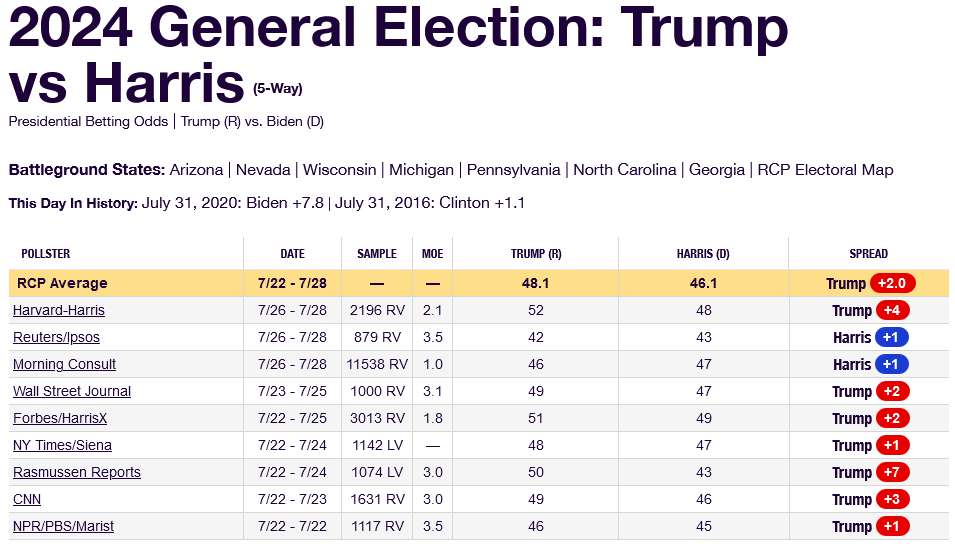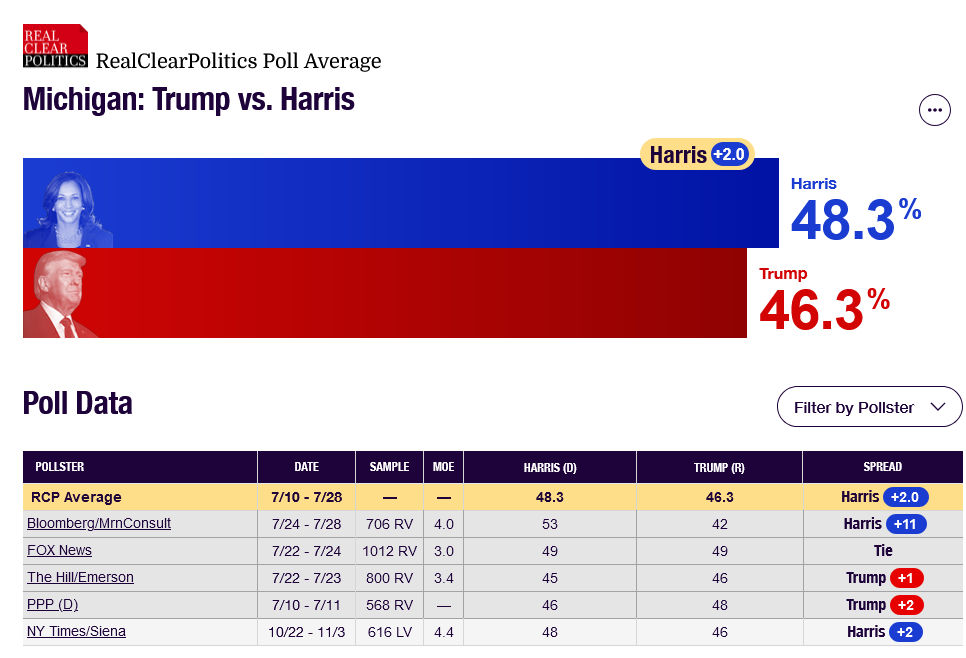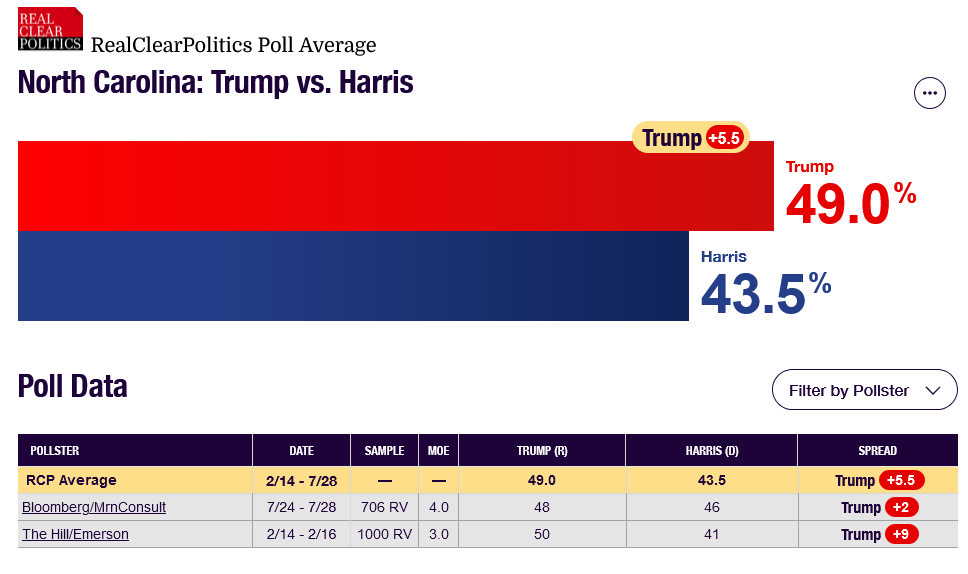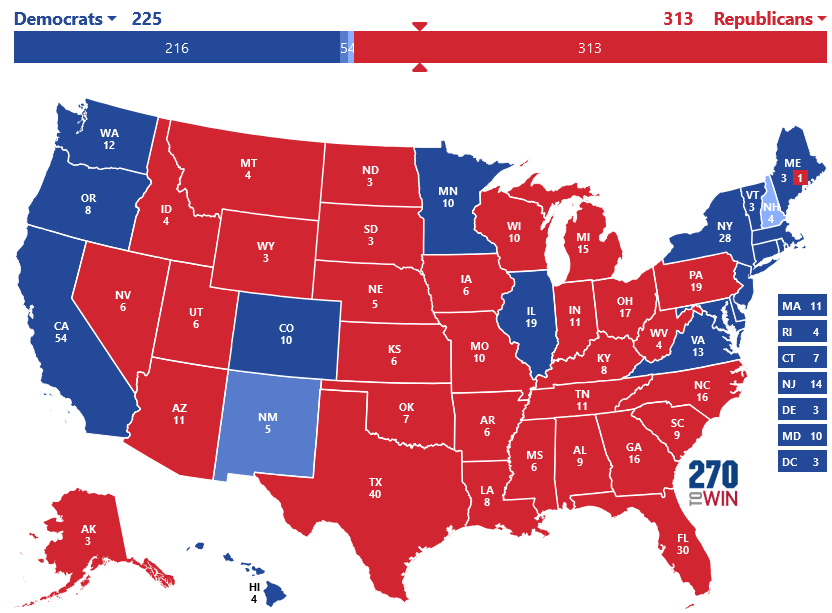Vice President Kamala Harris has a higher approval rating against President Donald Trump in general election polls than former candidate Joe Biden, but is still projected to lose the Nov. 5 election.
Election forecaster Nate Silver predicts that Harris has a better chance of winning the popular vote than Trump, but there's a good chance she could lose the crucial Electoral College vote, as Hillary Clinton did in 2016.
And the Real Clear Politics Average of general election polls gives Trump a 2-point lead nationally and in six of the seven pivotal battleground states that could decide the election for either candidate.
Silver's prediction — that Trump will likely lose the popular vote again but win the election — is why Democrats want to abolish the Electoral College, which they have been pushing for since 2000, when George W. Bush lost the popular vote to Al Gore but won the Electoral College.
Silver Forecast
This morning, Silver explained Harris and Trump's likely victory.
The popular vote gives Harris a 57.1% to 42.9% chance of winning the popular vote.
But, of course, the popular vote does not decide US presidential elections; the Electoral College does.
Thus, Trump has a 56.9 percent chance of winning, compared with 42.5 percent for Harris. In Silver's model, Trump receives 273.8 electoral votes, while Harris receives 263.6.
“Harris will give Democrats a fighting chance. In fact, she is slightly ahead of Donald Trump in the popular vote. Democrats have won the popular vote in every election except for one since 2000,” Silver wrote on his website, the Silver Bulletin.
But that may not be a problem, he continued.
However, Harris trails Trump slightly in the Electoral College, risking a repeat of the popular vote/Electoral College split that hurt Democrats in the 2000 and 2016 elections. Harris is not alone in this: Biden also had large Electoral College and popular vote margins in 2020, narrowly winning some tipping point states despite winning the popular vote by 4.5 percentage points. But this remains a problem for Democrats, with Harris's popular vote/Electoral College margins showing slightly larger than Biden's projections.
Silver currently leads Harris 44.5% to 44.1% in the election polling average.
Real Clear Political Average
Silver's model, which projects Harris to beat Trump, differs significantly from the Real Clear Politics average (48.1-46.1), which projects Trump to beat Harris by 2 points.

Trump has won 15 of the last 20 polls.
And in key battleground states, Trump has maintained the leads he built over Biden, except in Michigan, where Harris holds a 2-point lead.




In the remaining categories, Trump leads by the following margins:
• 4.2 in Arizona
• Georgia: 3.6
• Nevada 4
• 5.5 in North Carolina
• 2.7 in Pennsylvania
• 0.2 in Wisconsin


Combining all the states where Trump is very likely to win, plus the battleground states except Michigan, Trump's Electoral College margin is 313-225. And that doesn't include Virginia, where polls have shown Trump to be competitive, and where voters cast their ballots for Barack Obama in 2008. Those voters are concentrated in Roanoke, Richmond, Norfolk, Hampton Roads, and major urban areas in Northern Virginia, including Fairfax and Arlington counties, and the city of Alexandria.
A June poll put Trump tied with Biden in the Old Dominion, but a New York Times/Siena poll found Harris holding a 5-point lead.
The question is whether Harris can maintain her lead in what was once a conservative state, which Biden ceded to Trump and which, mirroring the national electoral map, leans Republican everywhere except in urban areas.
Still, as the headline of the Silver Bulletin analysis put it, “Harris is in a much better position than Biden. But she has one big problem: the Electoral College.”
A big problem for Democrats in general
And indeed, the Electoral College is a big problem for Democrats. They hate it because in some key states, like California and New York, rural Americans have a better chance of winning the vote than left-leaning urban areas.
Knowing they likely couldn't amend the Constitution, leftists proposed a new idea: a “national popular vote” bill that would allow states to work together to cast their electoral votes for the candidate who won the national popular vote.
“A national popular vote law will take effect once enacted in states that receive a majority of the electoral votes (270 out of 538 states),” the website states.
The presidential candidate who receives the most popular votes in all 50 states and Washington, D.C., will then receive the electoral votes from all enacted states, meaning the candidate who receives the most popular votes nationwide will be guaranteed enough electoral votes to become president.
Not surprisingly, the effort has found support almost exclusively in Democratic states, with backers claiming that 3,705 state legislators support it.
Shockingly, this represents half of the national total of 7,575.
